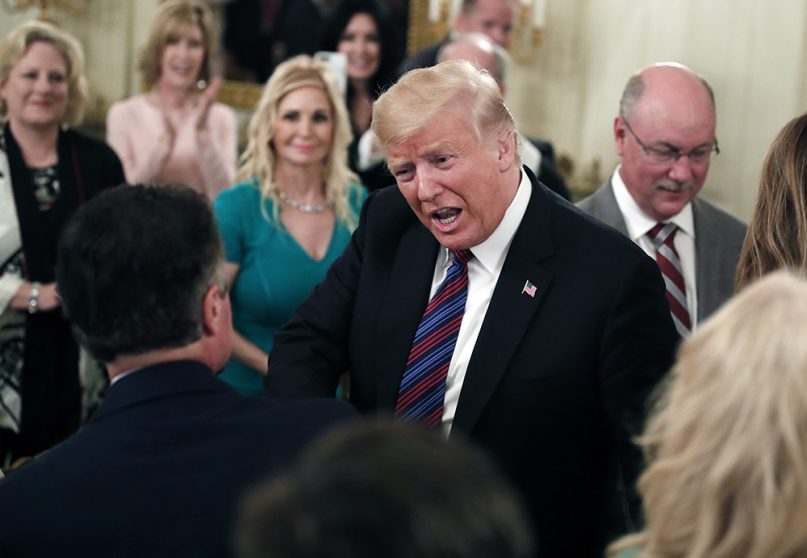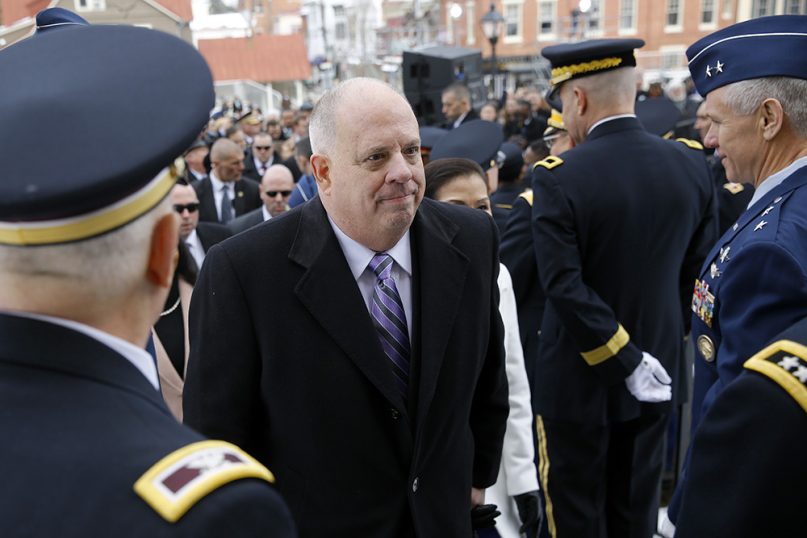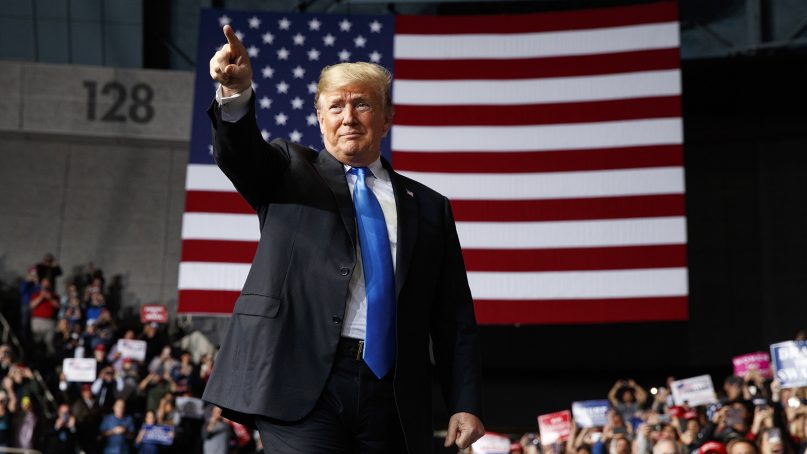
President Trump greets people as he arrives to speak during a dinner for evangelical leaders in the State Dining Room of the White House on Aug. 27, 2018, in Washington, D.C. (AP Photo/Alex Brandon)
Earlier this month, two important conservative writers explained why honorable Republicans are strongly considering a challenge to Donald Trump for the party’s 2020 presidential nomination.
Writing in The Bulwark, an online publication that took on former staff from the recently shuttered Trump-skeptical conservative journal The Weekly Standard, Jonathan V. Last persuasively argues that a primary challenge to Trump should be expected. Of the last nine incumbent presidents who stood for re-election, five were contested for re-nomination. Trump is almost sure to be one of them; Last has already previewed five potential challengers.
A few days later, in a powerful Washington Post op-ed, Stephen F. Hayes framed the primary challenge as a necessity for the well being of the country and something all people of goodwill should expect and support.
But the coming primary challenge has zero chance of success unless a significant number of white evangelicals, who gave the race-baiting billionaire 81 percent of their votes in 2016, get off of Trump’s Road to Reelection before 2020.
Neither of the two conservative writers above discusses the possibility of evangelicals parting ways with Trumpism. Political observers seem to assume that Trump’s conservative Christian base will follow him no matter what.
And why not? Some of his evangelical disciples have explicitly said there is nothing he could do to lose their support.
Yet a divorce is not impossible, and it won’t require white conservatives to suddenly back a Democrat. Trump’s white evangelical support has already fallen in the wake of chaos in the administration and the longest government shutdown in history. If the walls continue to close in around the president, he may yet lose even more support.
That may come as a surprise to those who think that Trump has brainwashed evangelicals somehow into believing he will restore a Christian America. Though many commentators, including me, have often questioned how the unchristian Trump could mesmerize professed believers, the truth is that the brainwashing began with the rise of the religious right in the 1980s. If you tell people for 35 years that they must vote for one party as a matter of religious devotion because the other party is so god-awful, they do it.
But what politics grants, politics can take away. The white Christians, Protestant and Catholic, who embraced Donald Trump made a fairly ordinary bargain in our transactional, interest-group-oriented politics, even if it looks strange for people whose Savior preached and practiced holiness: they gave their votes in exchange for a promise to enact their agenda.
That’s why they could be taken back by a candidate who makes a serious effort to offer them a decent Republican alternative, a person who does not destroy their integrity or make a mockery of their supposed values. And for the sake of the country and the Party of Lincoln, every patriot must hope it succeeds.

Maryland Gov. Larry Hogan departs after his inauguration ceremony on Jan. 16, 2019, in Annapolis, Md. Hogan is the first Republican governor to be re-elected in the state since the 1950s. (AP Photo/Patrick Semansky)
Republican leaders have already begun encouraging potential candidates. Maryland Gov. Larry Hogan, who is reportedly considering a primary challenge to Trump, contrasts with the president in ways that should matter. He is a decent and competent man of quiet strength and dignity. Hogan would give social conservatives almost everything Trump has offered but will not demand they squander their integrity as a down payment.
A cancer survivor who leaned on his faith during that battle, he has a story that resonates, and, perhaps more importantly, is a proven fighter — anyone facing off against Trump will have to prove his willingness to stand up to the president’s excesses in ways that will invite and inspire conservative evangelicals and Catholics.
The most obvious group of defectors are those who will jump at any other candidate with conservative policy views. For these people, the 2016 nominating contest led them to Trump by default. In that crowded primary season, a majority of voters preferred a candidate other than Donald Trump, but studies show that some subset of voters simply wants to “back a winner.”
If 2019 unfolds badly for Trump and he looks weak in 2020, many voters, even evangelicals, will flock to a superior candidate, especially if she or he looks, talks and acts like a winner.

President Trump arrives to speak at a campaign rally at Bojangles’ Coliseum on Oct. 26, 2018, in Charlotte, N.C. (AP Photo/Evan Vucci)
Others agreed to vote for Trump because they expected that he would rise to the stature of the office. They may now accept that he won’t. Even those who expected a certain amount of incompetence, corruption, and lies may be persuaded to think that a line has been crossed.
My conversations with Washington insiders have convinced me that the primary challenge will happen. If it does, Trump-skeptical evangelical leaders who are despondent about the past three years need to do everything they can to support the effort, even if behind the scenes.
I have opposed evangelical Trumpism from the beginning. Some of those supporters are members of my own family. As long as there is a chance for decency and honor to prevail, I will make the case to them. I will not give up on my family, just as I will not give up on my country.
I will work alongside evangelical friends who stand on the biblical promise, “Thou hast girded me with strength unto the battle” (Psalm 18:39). The 2020 GOP primary is a fight for the soul of conservatism. Evangelicals should not sit it out, and it cannot be won without them.
The views expressed in this commentary do not necessarily represent those of Religion News Service.
